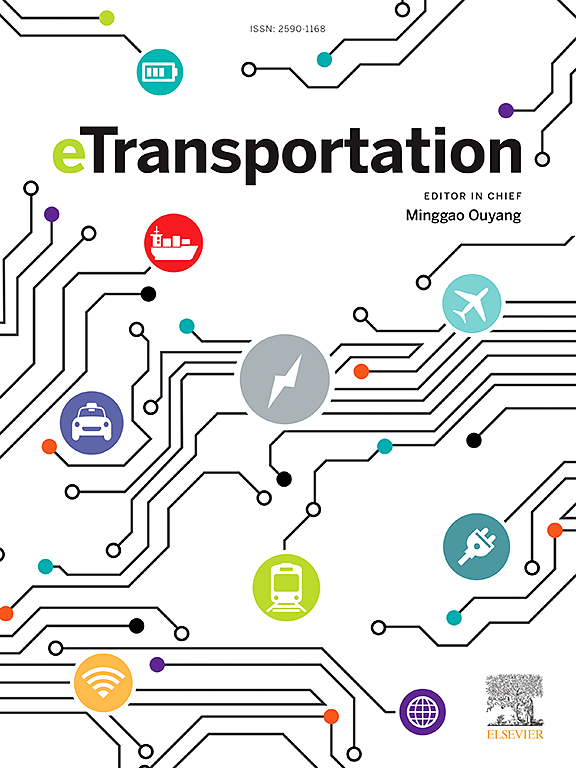零排放电动客车热电储能协同优化
IF 17
1区 工程技术
Q1 ENERGY & FUELS
引用次数: 0
摘要
在冬季,纯电动汽车舱室加热系统的运行可能会显著降低电池寿命和续驶里程,因为这会延长舱室预热时间,并增加与保持舒适舱室温度相关的大量能源消耗。这些都对电池电动汽车在寒冷气候下的整体性能和实用性提出了显著的挑战。为了应对这一挑战,提出了热能存储,特别是基于金属相变材料的热能存储装置的集成,以延长行驶里程并减少冷启动时的座舱预热时间。基于详细的电池电动客车仿真模型,开发了一个储能系统规模框架。基于实际驾驶数据,得到的储能系统最优配置为电池容量318.8 kWh,储能容量86.5 kWh。使用这些设备进行加热,客舱预热时间最多可减少68.3%,电池使用寿命可延长13.8%,从而每年降低7.8%的运营成本。该研究表明,通过将热能储存与电池电动客车相结合,电动客车的性能得到了显著改善。本文章由计算机程序翻译,如有差异,请以英文原文为准。
Synergistic optimization of thermal and electrical energy storage for zero-emission electric buses
In winter, the operation of cabin heating systems in battery electric vehicles could significantly decrease battery lifespan and driving range, due to extended cabin warm-up time and substantial energy consumption increase associated with maintaining a comfortable cabin temperature. These pose a notable challenge to the overall performance and practicality of battery electric vehicles in cold climates. To address this challenge, thermal energy storage, particularly, the integration of a metallic phase change material-based thermal energy storage device is proposed to extend the driving range and reduce the cabin warm-up time during cold start. An energy storage system sizing framework based on a detailed battery electric bus simulation model incorporating this approach was developed. Based on real-world driving data, an optimal energy storage system configuration was obtained as 318.8 kWh of battery and 86.5 kWh of thermal energy storage. Using these devices for heating, the cabin warm-up time was found to be reduced by up to 68.3 % and the battery service life could be extended by 13.8 %, leading to an annual operating cost reduction by 7.8 %. This study demonstrates the significant improvements of electrical bus performance through the integration of thermal energy storage with battery electric buses.
求助全文
通过发布文献求助,成功后即可免费获取论文全文。
去求助
来源期刊

Etransportation
Engineering-Automotive Engineering
CiteScore
19.80
自引率
12.60%
发文量
57
审稿时长
39 days
期刊介绍:
eTransportation is a scholarly journal that aims to advance knowledge in the field of electric transportation. It focuses on all modes of transportation that utilize electricity as their primary source of energy, including electric vehicles, trains, ships, and aircraft. The journal covers all stages of research, development, and testing of new technologies, systems, and devices related to electrical transportation.
The journal welcomes the use of simulation and analysis tools at the system, transport, or device level. Its primary emphasis is on the study of the electrical and electronic aspects of transportation systems. However, it also considers research on mechanical parts or subsystems of vehicles if there is a clear interaction with electrical or electronic equipment.
Please note that this journal excludes other aspects such as sociological, political, regulatory, or environmental factors from its scope.
 求助内容:
求助内容: 应助结果提醒方式:
应助结果提醒方式:


